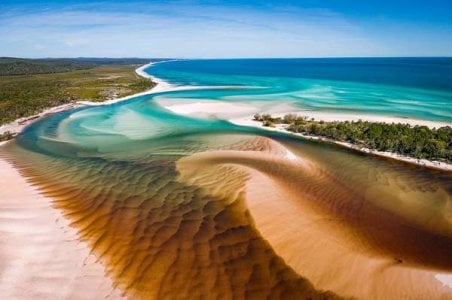This Illegal Act Could Cost Tourists Half a Million Dollars - Are You at Risk?
By
Danielle F.
- Replies 5
Australia is renowned for its stunning natural landscapes and unique wildlife, which draw millions of tourists each year. However, visitors to one of the country's most beloved holiday destinations, K’gari (formerly known as Fraser Island), are being issued a stern warning: tampering with the island's natural resources, particularly whale bones, could land you in serious trouble, including a hefty fine or even jail time.
The caution comes on the heels of an incident where a tourist attempted to take a large whale bone from the island, only to be informed of the legal consequences and subsequently surrender it to the rangers. This is not a trivial matter; the maximum penalty for such an illegal act in Queensland is a staggering $483,900 or two years behind bars.
K’gari is not just a tourist hotspot; it holds deep cultural significance and plays a vital ecological role. Whale carcasses, while they may seem like intriguing curiosities, are an integral part of the island's environment. The Department of Environment and Science (DESI) in Queensland has reminded residents and visitors that these remains must not be disturbed.
The warning has been reiterated following the discovery of a decomposing whale calf on the beach, the fifth humpback calf to strand during the current migration season. Rangers found the calf and, based on veterinary advice, made the difficult decision to euthanize it. The carcass bore large lacerations believed to be shark bites, offering a grim insight into the harsh realities of nature.
Whale bones, while fascinating, are not souvenirs. They can carry zoonotic diseases, posing a health risk to humans. Moreover, they are part of the delicate balance of the island's ecosystem and hold cultural importance to the indigenous Butchulla people, the traditional custodians of K’gari.
The issue of whale bone theft is not unique to Australia. In New Zealand, similar warnings have been issued after incidents involving the use of chainsaws to remove bones from beached whales. These acts are not only illegal but deeply disrespectful to the Maori, for whom whale bones are significant cultural artifacts.
As members of the Seniors Discount Club who cherish Australia's weird and wonderful environment, it's crucial to respect the laws that protect our natural heritage. If you're planning a trip to K’gari or any other natural reserve, remember that the beauty of these places lies in their untouched splendor. Let's preserve it for future generations to enjoy.

We encourage you to share your thoughts on this topic. Have you visited K’gari or another location where the natural environment is under protection? How do you feel about the balance between tourism and conservation? Join the conversation below and let us know your experiences and opinions.
The caution comes on the heels of an incident where a tourist attempted to take a large whale bone from the island, only to be informed of the legal consequences and subsequently surrender it to the rangers. This is not a trivial matter; the maximum penalty for such an illegal act in Queensland is a staggering $483,900 or two years behind bars.
K’gari is not just a tourist hotspot; it holds deep cultural significance and plays a vital ecological role. Whale carcasses, while they may seem like intriguing curiosities, are an integral part of the island's environment. The Department of Environment and Science (DESI) in Queensland has reminded residents and visitors that these remains must not be disturbed.
The warning has been reiterated following the discovery of a decomposing whale calf on the beach, the fifth humpback calf to strand during the current migration season. Rangers found the calf and, based on veterinary advice, made the difficult decision to euthanize it. The carcass bore large lacerations believed to be shark bites, offering a grim insight into the harsh realities of nature.
Whale bones, while fascinating, are not souvenirs. They can carry zoonotic diseases, posing a health risk to humans. Moreover, they are part of the delicate balance of the island's ecosystem and hold cultural importance to the indigenous Butchulla people, the traditional custodians of K’gari.
The issue of whale bone theft is not unique to Australia. In New Zealand, similar warnings have been issued after incidents involving the use of chainsaws to remove bones from beached whales. These acts are not only illegal but deeply disrespectful to the Maori, for whom whale bones are significant cultural artifacts.
As members of the Seniors Discount Club who cherish Australia's weird and wonderful environment, it's crucial to respect the laws that protect our natural heritage. If you're planning a trip to K’gari or any other natural reserve, remember that the beauty of these places lies in their untouched splendor. Let's preserve it for future generations to enjoy.
Key Takeaways
- Visitors to K'gari (formerly Fraser Island) are warned against stealing whale bones, with penalties up to $483,900 or two years in prison.
- A tourist was caught trying to steal a massive whale bone from the island but surrendered it to rangers when informed of the law.
- The bones are considered culturally and ecologically important to the island, and disturbing whale carcasses is illegal.
- The article also highlights similar issues of whale bone theft in New Zealand, where culprits face substantial fines.








